The $480k (£380k) gift will enable to the College to fund the creation of several new spend-down posts:
This gift builds on Mr Richey’s previous generous support to College, which includes a £1m gift to endow of a graduate studentship at Jesus in any subject, and the naming of the Buchanan Tower Room in honour of alumnus and First World War hero Captain Angus Buchanan VC.
The provision of funding for additional early career fellowships, academic skills training for students, research associations and graduate studentships, will support key academic priorities for the College. In addition to continuing their research while at Jesus, the Nelson J. Carr CDF in Academic Skills Support will be responsible for developing and delivering a programme of skills-based training for both undergraduate and graduate students, and especially for those who join the College from disadvantaged backgrounds or without English as a first language. Training will include topics such as time-management, writing, giving presentations, reading and note-taking, and how to approach assessed work. The establishment of the Earle J. Richey Digital Access Officer post will enable Jesus’ Access and Outreach team to enhance its production of digital content to reach more prospective students from disadvantaged backgrounds.
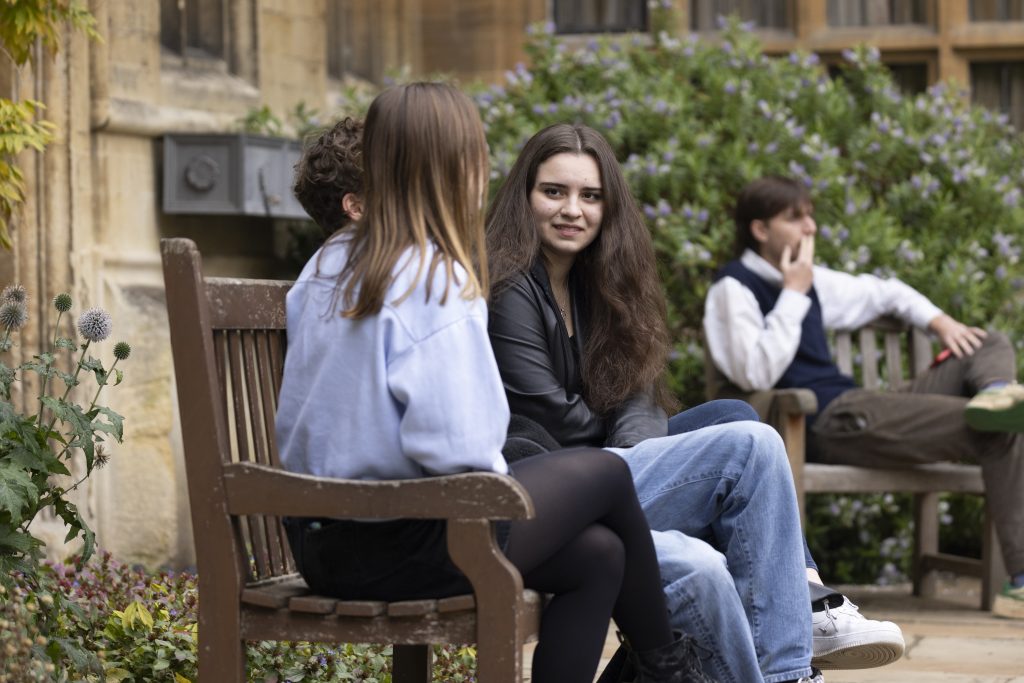
Jesus students will benefit hugely from Mr Richey’s new gift to College.
Photo credit: Andrew Ogilvy
In naming the new posts, Mr Richey wishes to acknowledge the vital role family history and benefaction has played in his own achievements. Richey explains, “I owe a huge debt of gratitude to my grandfather, Earle Jacob Richey, and his business partner and brother-in-law, Nelson J. Carr. These gifts are a way of expressing that gratitude. Nelson J. Carr, of Osage, Cherokee, and European descent, provided the capital to start Richey and Carr’s Rexall, a local pharmacy and general store in Erie, Kansas, in the 1920’s, while my grandfather provided the knowledge and labor. While his formal education ended at age 12 when his family was left bereft, having been abandoned by their husband and father, Earle was apprenticed out as a shop boy in a nearby town, and studied on his own time and became a licensed pharmacist. That Richey and Carr store provided the income that put my own father and three of his brothers through college during the 1930s and 1940s, which were hard times to raise, educate, and provide for children.
The store finally closed in the early 2000s, having provided three generations of Richeys a good base from which to start. Its longevity is a testament to the value that Earle placed upon education and family. He was a very bright man who just lacked the opportunity in terms of formal education to hone his intelligence. Ultimately, it was Nelson’s generosity and Earle’s hard work that meant my father got his college education, and provided me with the opportunity to attend and obtain a degree from Oxford University. It is my hope that these gifts likewise provide a path of opportunity to others.”
He adds, “I also want to honor those two men because of the emphasis they placed on family; having held families together through the Great Depression, as well as the Osage murders, though each came from less than ideal family upbringings.”
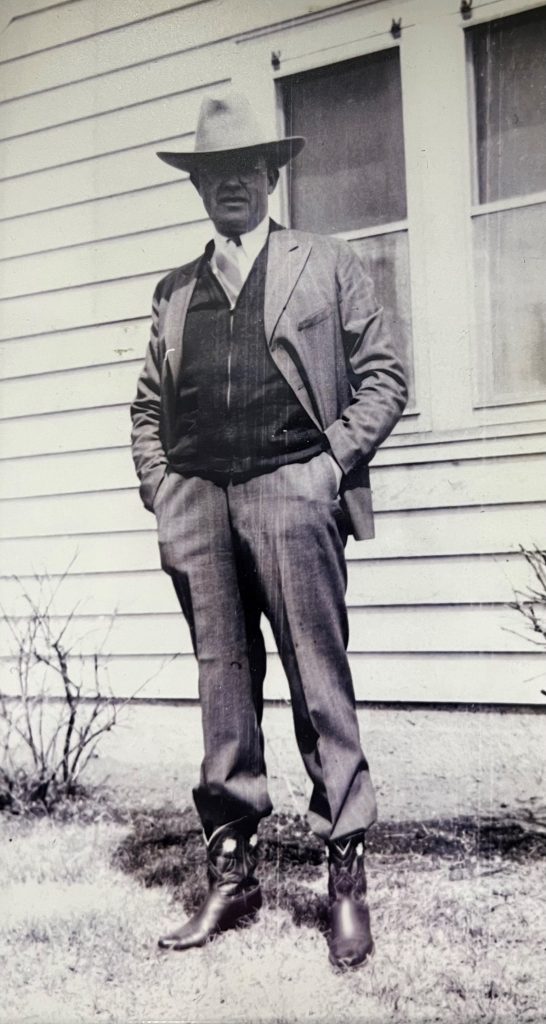
Nelson J Carr
The creation of ten new Dr Sara Hope Browne Research Associates in Medical Sciences will be available to scholars at Oxford without a specific College affiliation, and are named in honour of Mr Richey’s wife. Dr Browne M.D. is an Emeritus Professor of Clinical Medicine in the Department of Medicine, Division of Infectious Diseases, at the University of California, San Diego (UCSD). She received her undergraduate education at the University of Cape Town, RSA and her medical degree from the University of Oxford School of Medicine. She has a Master’s in Public Health from the Harvard University School of Public Health, where she was a Fulbright Scholar. She completed her UK license at the John Radcliffe Hospital, Oxford, and has also founded a charity, Specialists in Global Health, which is dedicated to training doctors in developing countries, in specialties of medicine. Mr Richey says, “Sara’s main focus is on Global Health. The named Research Associates at Jesus are a meaningful way to connect her medical legacy and Oxford training to College.”
The match-funded four-year DPhil Studentship in Computer Science is given in the name of Professor Sir Nigel Shadbolt FRS, who has been Jesus College Principal since 2015, and is a world-leading expert in computer and data sciences. Mr Richey also noted, “It is important to acknowledge Sir Nigel’s monumental contribution to both the physical and intellectual expansion of the College. His tenure as Principal has firmly placed Jesus College at the center of the future of the University. I am honored to be able to attach his name to this DPhil scholarship in Computer Science.”
Dr Brittany Wellner-James, Jesus College Director of Development, reflected, “We are enormously grateful to Chris and the Richey Family Foundation for their continued generosity to College, and for this transformational gift to further support our academic priorities”.
The new posts will commence in Michaelmas 2024.
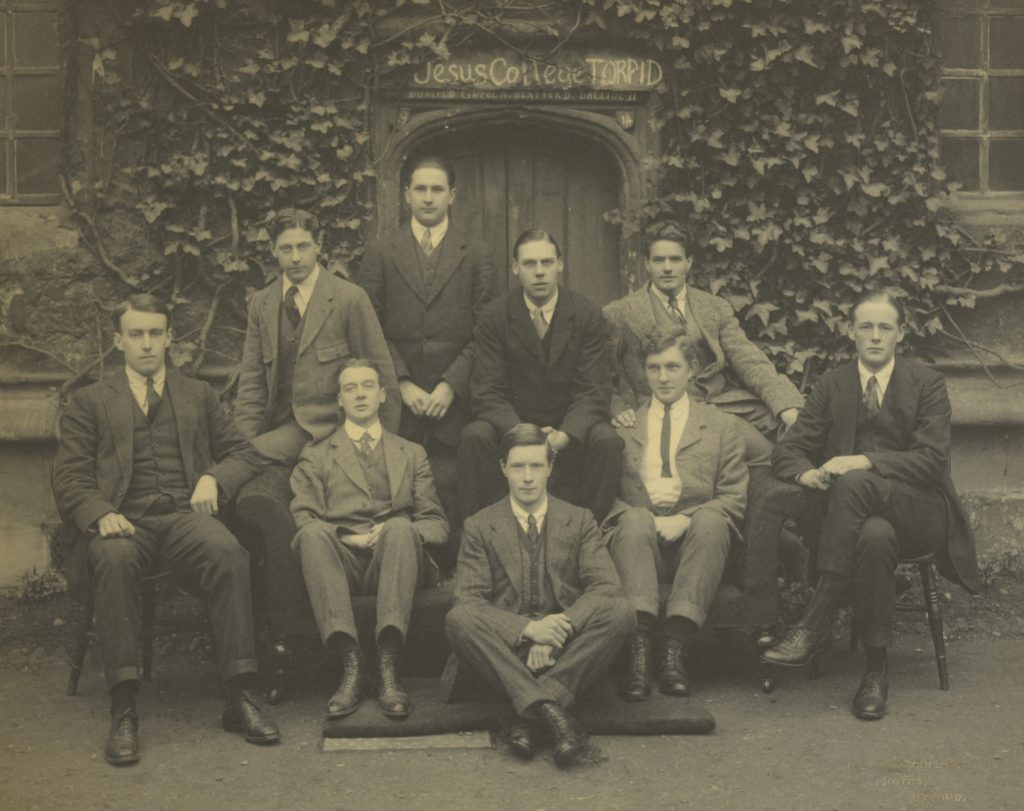
The Jesus College Boat Club Torpid Crew of 1914. Back row, from left to right: Walter Hankinson (1913, Mathematics), Wilfred Davies (1913, Mathematics), Lionel Collier (1911, Mathematics), Robert Norwood (1912, Chemistry). Middle row from left to right: Angus Buchanan (1913, Classics), James Herbertson (1911, Modern Languages), Reginald Champion ( 1913, Natural Sciences), Noel Morris (1913, Modern History). Front: Geoffrey Reeves (1913, Classics). Credit: Jesus College, Oxford
A year later, and every member of this crew had gone to fight in the Great War. Only four would return. The war wrought tragedy and loss on a global scale, and its impact was felt deeply within our community. An inscribed plaque in the College ante-chapel lists the sixty-four College members who lost their lives. It is certain that each would have had their own story of courage and bravery to tell, had they survived. There is, however, an important story that can be told and it concerns one particular member of that 1914 Torpid crew – a student who survived the war, and against all the odds, returned to Jesus complete his studies.
Angus Buchanan was a doctor’s son who had attended Monmouth Grammar School and came up in 1913 on a Welsh Classical Scholarship. His tutor noted that he was “a hard worker, and likely to be a good influence in College.” By Hilary term 1914, he had made his mark in sports, becoming a member of both the College’s rugby team, and the Torpid crew. As J.N.L. Baker, a former Bursar and contemporary of Buchanan’s, remembered in his obituary (Jesus College Magazine, 1944):
“He quickly made his mark in games. As a Rugby forward his hooking was excellent and his all-round play noteworthy. On the river, rowing four at 12 stone 2lbs, he helped the Torpid to put Jesus in a higher place than it had been for fifteen years.”
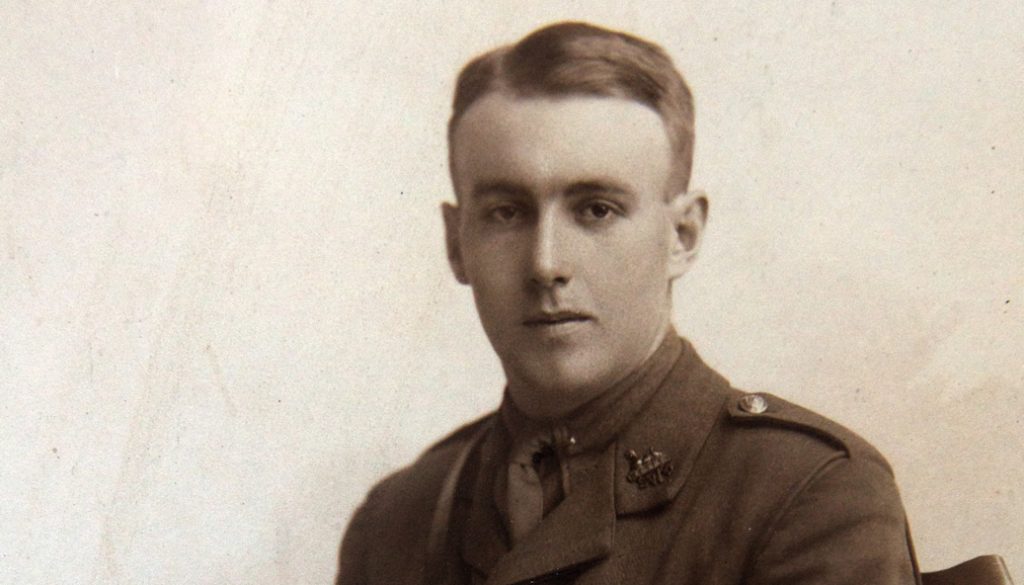
An image of Angus Buchanan taken 1914 Credit: Monmouth Grammar School
When war broke out Buchanan enlisted, joining the South Wales Borderers. He headed east to Gallipoli, where the trench warfare that typified the Anglo-French campaign against Turkey echoed the brutal fighting of the Western Front. Despite being wounded, he was awarded the Military Cross for ‘exceptional gallantry during active operations’ and promoted to Captain.
Mesopotamia followed for the young soldier, and it is here on 5th April 1916 that Buchanan – still only 21 – carried out an act of such bravery and benevolence that he was awarded the Victoria Cross (VC). The citation for his VC reads:
“For most conspicuous bravery. During an attack an officer was lying out in the open severely wounded, about 150 yards from cover. Two men went to his assistance and one of them was hit once. Captain Buchanan, on seeing this, immediately went out, and with the help of the other man, carried the wounded officer to cover under heavy machine gun fire. He then returned and brought in the wounded man, again under heavy fire.”
He was also awarded the Russian Order of St Vladimir 4th Class for his actions.
Wounded for a second time in the attack, Buchanan spent some time in rehabilitation before stoically returning to Mesopotamia in 1917. However his return to the frontline was tragically short-lived. In March of that year, while fighting in Kurt, he was shot in the head by a Turkish sniper, and blinded. For a lesser man, the burden of such a catastrophic injury might have been too much, but, as J.N.L. Baker remembered, Buchanan drew on his own bravery again.
“This cruel blow did not daunt him. He came back to Oxford determined to be an ordinary undergraduate. Every branch of College life he followed with great interest and intimate knowledge.”
As well as restarting his degree (he switched from Classics to Law), Buchanan returned to the river – rowing in the College First Eight during Hilary term 1919. He was also a familiar face on the touch line when Jesus were playing rugby. In the Torpid crew photo taken that year, the physical suffering that Buchanan had endured is clear to see, but he did not court sympathy or preferential treatment.
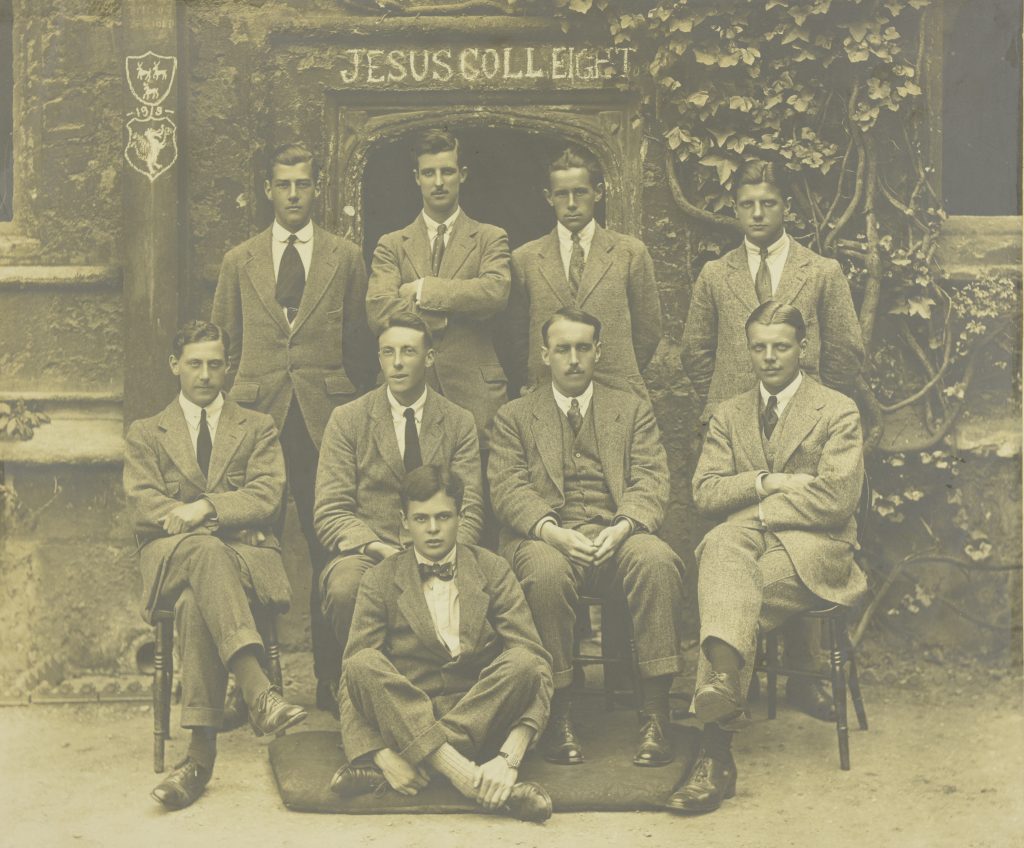
The Torpid crew of 1919, with Buchanan seated in the middle row, third from left. All bar one of the 1919 crew had seen action during the war. Credit: Jesus College, Oxford
Baker said, “His unassumed modesty, great courage and open friendliness made him perhaps the best liked man in College, and one felt that one was the better for knowing him.”
Little is known of the help that the now-blinded Buchanan received with his studies. However, College Archivist Dr Robin Darwall-Smith observes in an article from Jesus News 2018, that “the Vice-Principal, Ernest Hardy (who became Principal in 1921) had been blind for many years. In Hardy, Buchanan could find the perfect role model.” He was certainly well-known and highly respected in College, and more widely, as the heroic undergraduate VC. Notes in the College archives show that he chaired the first post-war meeting of the Junior Common Room on 3 May 1919, and in January 1921, it was Buchanan who unveiled a War Memorial in the old Junior Common Room (now the War Memorial Room).
He also became friends with another famous Jesus alumnus – T.E. Lawrence, with whom he would dine regularly. Robin says, “Both Lawrence and Buchanan were heroes to the outside world, as “Lawrence of Arabia” and “Buchanan the Undergraduate VC”. But when they were alone together, the two men could lay aside their heroic personas: they were each with perhaps the only man in Oxford who really understood them.”
After graduating in 1921, Buchanan trained as a solicitor. He returned to practise in his hometown of Coleford in Gloucestershire, where he lived until his early death at the age of 49 – a death accelerated by the wounds he had sustained in combat.
But that is not the end of Buchanan’s story. Firstly, we can see the man himself to this day, in British Pathe News footage from his VC investiture in 1917, which shows a dapper Buchanan being presented with his medal by King George V, and being led to and from the dais. His old school Monmouth Grammar (now Haberdashers’ Monmouth Schools) never forgot their most-decorated alumnus: Buchanan House (home to Year 13 boarders) bears his name ‘as a fitting memorial to an Old Monmothian for his courage, physical bravery, lack of bitterness in the face of adversity and generosity of spirit”. The recreation ground in Coleford, which sits adjacent to the cemetery where Buchanan is buried, was also named in his honour. And of course his inspirational story features in numerous military history books and on related military websites.
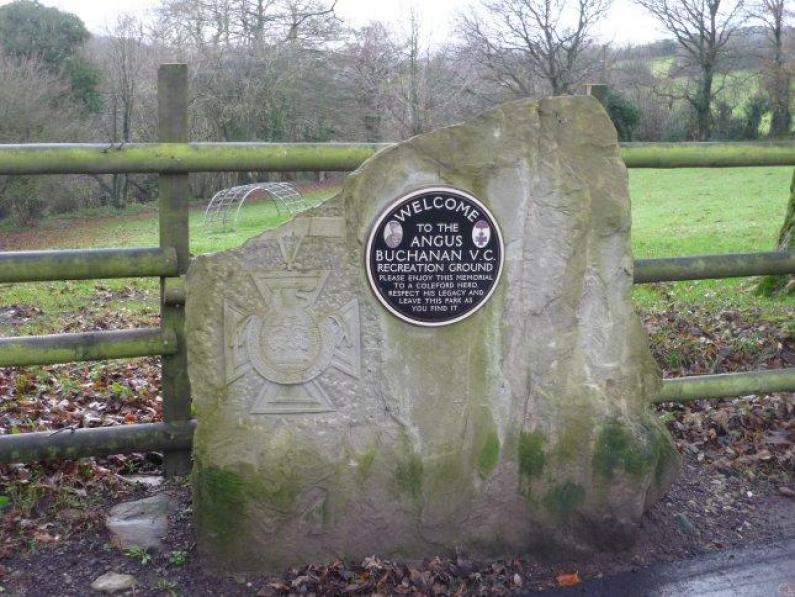
The Angus Buchanan VC Recreation Ground in his hometown of Coleford. Credit: Forest of Dean Local History Society
Now, Jesus College is delighted to name the Tower Room (below) in our new Cheng Yu Tung Building in Buchanan’s honour, thanks to a generous gift by alumnus Christopher Richey (1984, MPhil Management Studies) and his family. The £1m gift, announced earlier this year, will enable the creation of a new endowed graduate scholarship to support home graduate students in any subject, and forms part of the College’s strategy to create more equitable opportunities for postgraduate study at the University of Oxford. The naming of the Buchanan Tower Room will ensure that one of our most courageous former students is remembered and appreciated by generations of students to come.